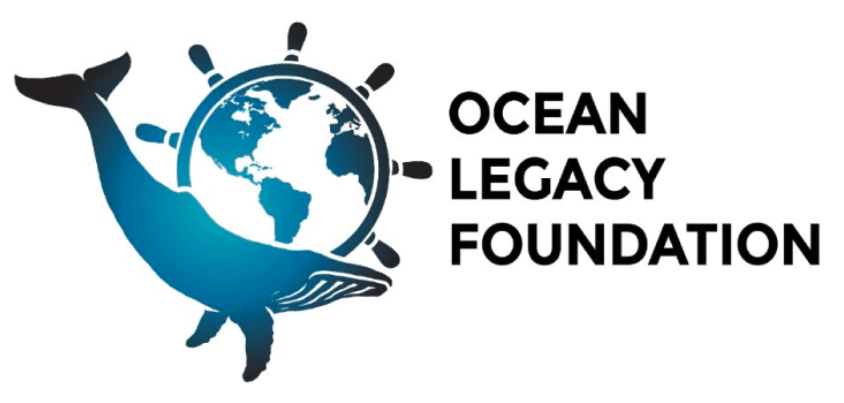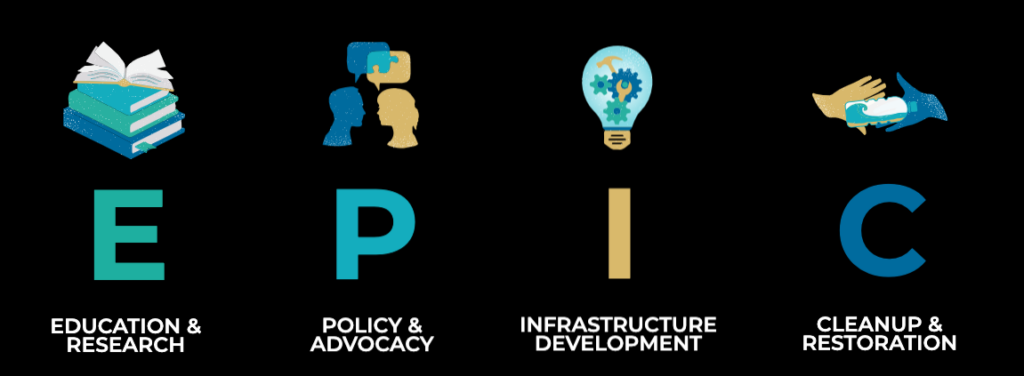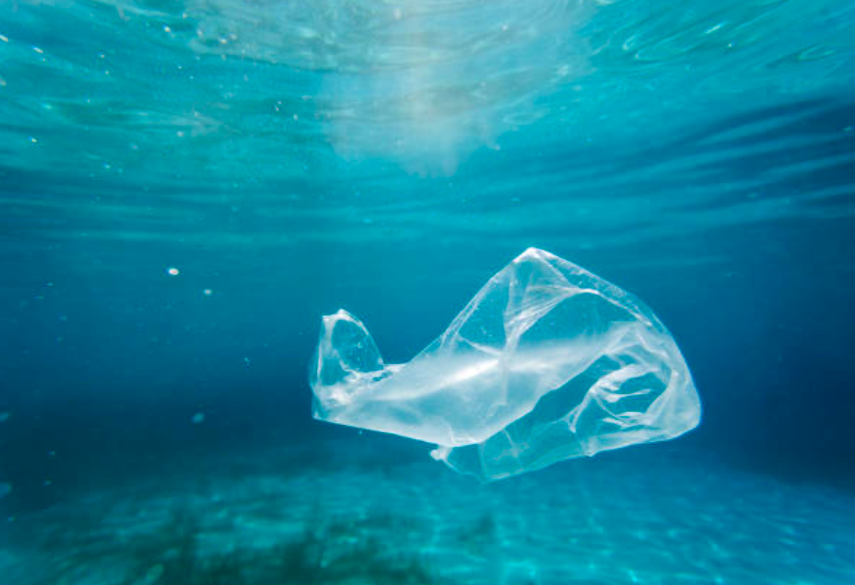Building a Circular Economy for Marine Plastics: Lessons Learned
Plastic pollution severely impacts marine life, ecosystems, and human health. Chloe Dubois, Co-founder and Executive Director at Ocean Legacy Foundation, discusses how they address plastic pollution with their EPIC Approach—Education & Research, Policy & Advocacy, Infrastructure Development, and Cleanup & Restoration. Global educational campaigns, policy collaboration, advanced recycling technologies, and large-scale cleanups are key initiatives.

Plastic pollution in the oceans is one of the most pressing environmental issues of our time. With approximately 8 to 13 million metric tons of plastic waste entering marine environments annually, its impact on marine life, ecosystems, and human health is devastating. When exposed to UV light and the natural environment, plastic breaks down into micro and nano fragments, which are small particles of plastic that are hard to contain. Moreover, emerging science has begun to uncover the damaging human health effects of microplastics and the implications they may have by proliferating the food chain. The urgency to address this issue is evident and has led to the establishment of the Ocean Legacy Foundation, more than a decade ago, to tackle the problem of plastic pollution. As a non-profit organization we have taken on the challenge of addressing this crisis through the development and implementation of our EPIC approach.
The EPIC Approach
To achieve plastic-free lands and waters, we have developed and implemented several innovative strategies based on our EPIC Approach. This approach integrates Education & Research, Policy & Advocacy, Infrastructure Development, and Cleanup and Restoration. EPIC is an emergency response system that mitigates, prevents, responds to and recovers these materials to prevent pollution from occurring, while cleaning and restoring environments from leakages that occur. This system is the basis of our EPIC response to plastic pollution. Our journey employing this strategy over the last decade provides valuable insights into building a circular economy for marine plastics, which can serve as a scale-up-model for others committed to mitigating plastic pollution.
Education
We have launched a free online Academy on plastic pollution, which is now being used in over 30 countries in English, French and Spanish to educate and engage communities globally. This curriculum is also being incorporated throughout Guatemala through national education campaigns in a restoration project to recover the Motagua River Basin, one of the most polluted rivers in the world.
Policy
Cross-sectoral collaboration is critical when creating effective, evidence-based policies that better manage plastic waste. Encompassing the many perspectives and needs from the people and environment in which the policy is intended to serve must be reflective if the policy is to be embraced and successfully implemented long term. We strongly believe that waste management policy should be guiding the design, production and end-of-life of new plastic products throughout the product’s entire lifecycle to ensure the principles of circularity are being fully utilized. To promote evidence-based legislative measures that better manage waste from leaking into the natural environment and which support a circular economy, we collect and provide detailed data sets of the materials we collect to work with First Nations governments, municipal, provincial and federal governments, industry, as well as civil society. This information can help to identify sources of pollution, material composition and the return rate of solid waste pollution across British Columbia. These data sets also inform pollution mitigating strategies, especially for industrial waste and fishing gear to prevent it from becoming Ghost Gear.
Infrastructure Development
Investing in advanced waste processing technologies led to the establishment of the very first Marine Debris Recycling Facility in North America specializing only in the processing of marine sourced plastics. We have designed a system with infrastructure capable of size- reducing, washing and extruding hard and fibrous plastics of 3 different resins, polypropylene (PP), polyethylene (PE) and Nylons (PA) collected from ocean, shoreline and marine industrial cleanups. These efforts have significantly enhanced Canada’s ability in processing these waste materials within its borders while contributing sources of recycled content back into the economy. These technological and systematic innovations have enabled Ocean Legacy to handle and pelletize large quantities of plastic waste while working with brands and manufacturers to produce products that align with the principles of circularity, inherently increasing the lifespan of coastal landfills by diverting waste and preventing waste from leaking back into the natural environment.
Cleanup & Restoration
Cleanup and restoration are key pieces of our strategy which remove mismanaged wastes from the environment to restore environmentally and culturally sensitive habitat. Working to clean the natural environment must now happen on an industrial scale to meet the need and level required from current leakage and pollution rates. Ocean Legacy has become a global leader in organizing industrially-scale remote expeditions to clean up plastic waste from some of the most affected and ecologically sensitive aquatic environments. These operations not only remove significant amounts of debris but also often bring countless community actors together to begin solving the complexities surrounding plastic waste. Employment, skill training and capacity building are key to improving the long-term conditions of polluted ecosystems while basing and guiding the work on Traditional Indigenous Knowledge by working alongside First Nations communities must become standard practice.

Challenges and Lessons Learned: Building a Circular Economy
We must prevent plastic pollution from occurring in the first place while also managing the leakages that are occurring if our lands and waters are to survive the plastic pollution crisis. Our mission is to transform how we manage plastics by integrating different EPIC solutions and the principles of the circular economy. This involves developing effective infrastructure capable of collecting and processing aquatically sourced plastics into high-quality materials, ready for new manufacturing. Promoting the reuse and recycling of materials, and creating a closed-loop system where plastics are continuously recirculated rather than discarded is also one of our main objectives through the development of our products. The journey has not been without its challenges, especially with so many diverse areas in our EPIC approach.
One of the main factors essential for success has been the sorting of different materials recovered during cleanup activities. It is common for cleanup organizations to run cleanup campaigns and use landfills as the solution for disposal of the materials. We wanted to put value on the material resources found on the shorelines and oceans. Therefore, we developed a detailed sorting guide to maximize the recycling rate of the materials, increasing the diversion rate from to over 90% depending on the cleanup and the materials found. Furthermore, conducting cleanups in remote and diverse environments has posed logistical complexities, including weather conditions and accessibility issues. Despite these challenges, our team has persevered, ensuring that each cleanup is as effective and efficient as possible.
Challenges in Plastic Recycling
A major challenge working with recycled materials has been inconsistent plastic markets which compete with the cheap price and higher quality of virgin plastics. Without recycled content mandates, there is little incentive for companies to pay more to use recycled content in products on an industrial scale when cheaper virgin resins are available. Another major challenge has been that many plastic product manufacturers are unfamiliar with working with recycled plastic, adding another layer of challenge and barriers when adding recycled content into new products. Although marine sourced plastics are more degraded than virgin sourced plastic, some of our principal challenges are the levels of organic contamination found in many of the items that have been exposed to the natural environment for long periods of time as well as the heterogenous nature of the resins found during cleanup activities. Part of overcoming these challenges has been to develop cleaning methods to reduce organic contamination from the plastic as well as to conduct constant sample testing to improve the quality of our pellets. This process has led to the development of our own plastic testing lab, which is now open to the public for testing their own plastics to better incorporate recycled content. Additionally, identifying the resins of the materials has been a significant hurdle. Some plastics are easy to identify with the use of a spectrometer, which allows us to determine their resin type and composition. However, many of the plastics we find are not designed for circularity and are either composed of different resins that are hard to separate or are made of materials that do not fall into any specific resin type, as they are compounds of unidentifiable materials.
Lessons Learned

Our journey has given us several valuable lessons and best practices for others looking to address plastic pollution. Engaging local communities and stakeholders in co-developing solutions that solve pollution is essential for the success of environmental initiatives, as it fosters leadership, accountability and drives tailored methods that reflect the respective environment and culture. Investing in innovative technologies and novel methods can significantly enhance the efficiency of waste management efforts. Continuous research and development are key to overcoming technical challenges and improving processes. Persistent advocacy for policy change, supported by proven demonstrated benefits, are vital for building broad-based support and driving legislative action. Having political will and investment have been key to success in setting up infrastructure as well as has provided the time needed to continue to build out critical market pieces and figure out a fiscally sustainable model. Finally, maintaining flexibility, determination and resiliency in the face of setbacks are crucial for long-term success. Our ocean and shoreline recycling projects often face unforeseen challenges, and being able to adapt and innovate are essential for overcoming these obstacles.
Results and Impact
Despite these challenges, our efforts at Ocean Legacy have yielded substantial results. We have removed 3 million pounds of debris from shorelines and ocean environments, significantly reducing the impact of plastic pollution in affected areas. Our advanced processing technologies have enabled us to divert over 2.7 million pounds of marine plastics through recycling initiatives, turning waste into valuable resources.
Our educational outreach through the online Academy and community training opportunities have educated thousands of individuals globally, fostering a community of advocates committed to environmental conservation. Our advocacy efforts have also contributed to the development of policies that support sustainable waste management practices and the reduction of plastic pollution. The EPIC approach addresses marine plastic pollution, demonstrating the potential of a circular economy for plastics. Through data-driven strategies, community engagement, technological innovation, and persistent advocacy, significant strides in combating plastic pollution can be made. Our journey offers valuable insights and best practices that can inspire and guide others in their efforts to create a sustainable future for lands and waters globally. By sharing these lessons, we hope to encourage collective action to foster a global movement towards environmental conservation.














